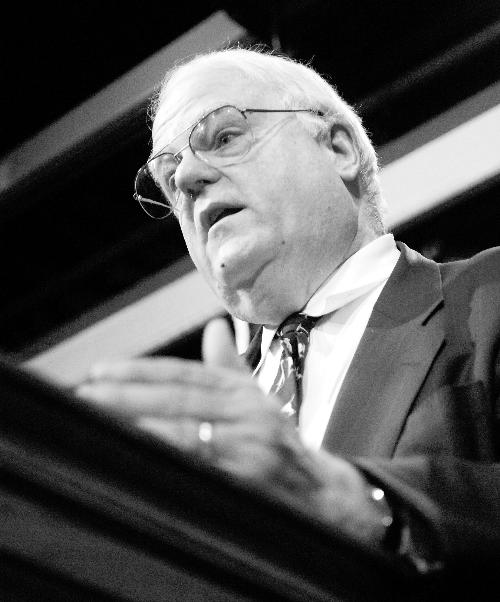
News
Summers Will Not Finish Semester of Teaching as Harvard Investigates Epstein Ties

News
Harvard College Students Report Favoring Divestment from Israel in HUA Survey

News
‘He Should Resign’: Harvard Undergrads Take Hard Line Against Summers Over Epstein Scandal

News
Harvard To Launch New Investigation Into Epstein’s Ties to Summers, Other University Affiliates

News
Harvard Students To Vote on Divestment From Israel in Inaugural HUA Election Survey
FBI’s Right to Library Records Could End
Partial Patriot Act extension “hopeful,” administrator says

In a series of eleventh-hour negotiations last month, Congress extended the expiration of key sections of the U.S.A. Patriot Act from Dec. 31 until Feb. 3 to allow more time to debate controversial provisions, including those that empower the Federal Bureau of Investigation (FBI) to demand patron information from libraries.
Harvard’s Senior Director of Federal and State Relations, Kevin Casey, wrote in an e-mail that the extension, which Congress passed Dec. 22, was an encouraging sign for members of the Harvard community previously critical of the Patriot Act’s civil-liberties provisions.
“It is a positive development that an extension was necessary, driven by a conflict over just how robust the protections for privacy should be,” Casey wrote in an e-mail.
According to Director of the University Library Sidney Verba ’53, the extent of federal access to patron information is a serious concern for libraries.
Under current Patriot Act provisions, the FBI can demand an individual’s borrowing history from the library, as well as library Internet and e-mail records, if these records are relevant to an ongoing terrorism or intelligence investigation.
Requests for personal borrowing records must be authorized by the Foreign Intelligence Surveillance Court, whose proceedings are secret. Internet and e-mail records, on the other hand, can be obtained with a National Security Letter (NSL) authorized by a senior FBI official.
Criticism of these measures has focused on the lack of regular judicial review over these information requests and the “gag rule” said to bar recipients of such requests from ever speaking about them.
Opponents of these provisions also say that the standard under which records can be demanded—relevance to a terrorism or intelligence investigation—is too broad and could potentially be abused.
According to Casey, the revised version of the Patriot Act that Congress debated in December addressed some of the worries that had been voiced over these measures.
The revised legislation, for instance, stipulates an NSL recipient’s explicit right to consult with an attorney.
But a bipartisan group of senators argued that the legislation did not adequately respond to civil-liberties concerns, and, threatening a filibuster, they were able to block the renewal of the Patriot Act on Dec. 16.
Political tensions were high. President Bush said that senators who voted against the renewal of the Patriot Act would be responsible for leaving Americans vulnerable when the sections of the Patriot Act expired. Bush also said that he opposed a short-term extension of the Patriot Act.
But with time running out before Congress adjourned for the holidays and opposition to the Patriot Act legislation still strong, the Senate finally passed a six-month extension of the Patriot Act on Dec. 21.
A day of frenzied negotiations followed between the House of Representatives, the Senate, and the White House. The final compromise was a five-week extension to allow time for discussion and possible revision of the controversial measures.
The senators who blocked the renewal of the Patriot Act legislation in its current form hope to set stricter parameters for FBI information demands and address what they call a lack of meaningful judicial review of the process, according to statements on their websites.
In particular, they said they hope to revise the standard under which the FBI can demand information from libraries and other organizations. Their proposed revisions would require the FBI to demonstrate a connection with a specific terrorist or spy, rather than a broad relevance to a terrorism or intelligence investigation.
Debate over the Patriot Act will continue to be affected by the recent news that President Bush authorized secret surveillance of Americans, Associate Professor of Government Barry C. Burden said.
Congress has a difficult month ahead, Burden said, with the budget—as well as the Patriot Act renewal—under consideration.
But Casey wrote that controversy over the Patriot Act means that concerns about its provisions are being addressed.
“This debate can only be viewed as a positive development and our Senators—and the Massachusetts House members—should be congratulated for shining a spotlight on this,” he wrote.
—Staff writer Lois E. Beckett can be reached at lbeckett@fas.harvard.edu.
Want to keep up with breaking news? Subscribe to our email newsletter.
